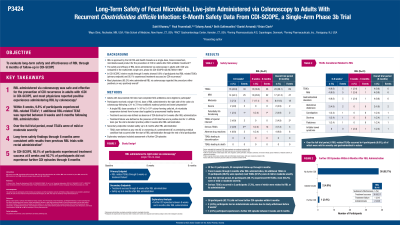Monday Poster Session
Category: Infections and Microbiome
P3424 - Long-Term Safety of Fecal Microbiota, Live-jslm Administered via Colonoscopy to Adults With Recurrent Clostridioides difficile Infection: 6-Month Safety Data From CDI-SCOPE, a Single-Arm, Phase 3b Trial
Monday, October 27, 2025
10:30 AM - 4:00 PM PDT
Location: Exhibit Hall

Has Audio

Sahil Khanna, MBBS, MD, MS
Mayo Clinic Rochester
Rochester, MN
Presenting Author(s)
Sahil Khanna, MBBS, MD, MS1, Paul Feuerstadt, MD, FACG2, Tahany Awad, 3, Beth Guthmueller, AS4, Daniel Armandi, 3, Brian Clark, 3
1Mayo Clinic Rochester, Rochester, MN; 2Yale University School of Medicine and PACT-Gastroenterology Center, Hamden, CT; 3Ferring Pharmaceuticals A/S, Kastrup, Hovedstaden, Denmark; 4Ferring Pharmaceuticals, Inc, Parsippany, NJ
Introduction: Fecal microbiota, live-jslm (RBL) is a microbiota-based product to prevent recurrent Clostridioides difficile infection (rCDI) in adults after standard-of-care antibiotic treatment. In CDI-SCOPE (NCT05831189), a multicenter, single-arm, phase 3b trial assessing the safety and efficacy of RBL when administered by colonoscopy to adults with rCDI, interim results through 8 weeks showed 9.8% of participants had RBL-related treatment-emergent adverse events (TEAEs) and 95.1% experienced treatment success (no CDI recurrence) (Khanna S et al. Therap Adv Gastroenterol. 2025:18:17562848251339697). This analysis presents long-term safety and efficacy through 6 months of follow-up in CDI-SCOPE.
Methods: Adults with documented rCDI who had completed standard-of-care antibiotics were eligible to participate in the trial. Participants received 1 dose of RBL by colonoscopy after a 24- to 72-hour antibiotic washout period and bowel preparation. Secondary endpoints included safety up to 6 months after RBL administration and assessment of CDI recurrence.
Results: Of the 41 participants, 39 completed follow-up through 6 months. From 8 weeks through 6 months after RBL administration, 36 additional TEAEs in 15 participants (36.6%) were reported, 1 of which (irritable bowel syndrome) was RBL-related. During this period, most TEAEs (97.2%) were of mild or moderate severity, and 1 serious, potentially life-threatening TEAE (worsening abdominal pain) unrelated to RBL was observed. Over the full trial period, 6 RBL-related TEAEs occurred in 4 participants (9.8%), all of which were mild in severity and gastrointestinal in nature. Overall, 23 participants (56.1%) experienced 69 TEAEs; 94.2% were of mild or moderate severity. Serious TEAEs occurred in 3 participants (7.3%), none of which were related to RBL or its administration. TEAEs of special interest were reported in 2 participants (4.9%) and were not related to RBL. During the full trial period, 38 participants (92.7%) did not experience CDI recurrence, 1 (2.4%) did between 8 weeks and 6 months, and 2 (4.9%) had an indeterminate outcome due to study withdrawal before 8 weeks.
Discussion: RBL administered via colonoscopy was safe and effective for the prevention of CDI recurrence in adults with rCDI in CDI-SCOPE. Long-term safety findings through 6 months were consistent with results from previous RBL trials.
Disclosures:
Sahil Khanna, MBBS, MD, MS1, Paul Feuerstadt, MD, FACG2, Tahany Awad, 3, Beth Guthmueller, AS4, Daniel Armandi, 3, Brian Clark, 3. P3424 - Long-Term Safety of Fecal Microbiota, Live-jslm Administered via Colonoscopy to Adults With Recurrent <i>Clostridioides difficile</i> Infection: 6-Month Safety Data From CDI-SCOPE, a Single-Arm, Phase 3b Trial, ACG 2025 Annual Scientific Meeting Abstracts. Phoenix, AZ: American College of Gastroenterology.
1Mayo Clinic Rochester, Rochester, MN; 2Yale University School of Medicine and PACT-Gastroenterology Center, Hamden, CT; 3Ferring Pharmaceuticals A/S, Kastrup, Hovedstaden, Denmark; 4Ferring Pharmaceuticals, Inc, Parsippany, NJ
Introduction: Fecal microbiota, live-jslm (RBL) is a microbiota-based product to prevent recurrent Clostridioides difficile infection (rCDI) in adults after standard-of-care antibiotic treatment. In CDI-SCOPE (NCT05831189), a multicenter, single-arm, phase 3b trial assessing the safety and efficacy of RBL when administered by colonoscopy to adults with rCDI, interim results through 8 weeks showed 9.8% of participants had RBL-related treatment-emergent adverse events (TEAEs) and 95.1% experienced treatment success (no CDI recurrence) (Khanna S et al. Therap Adv Gastroenterol. 2025:18:17562848251339697). This analysis presents long-term safety and efficacy through 6 months of follow-up in CDI-SCOPE.
Methods: Adults with documented rCDI who had completed standard-of-care antibiotics were eligible to participate in the trial. Participants received 1 dose of RBL by colonoscopy after a 24- to 72-hour antibiotic washout period and bowel preparation. Secondary endpoints included safety up to 6 months after RBL administration and assessment of CDI recurrence.
Results: Of the 41 participants, 39 completed follow-up through 6 months. From 8 weeks through 6 months after RBL administration, 36 additional TEAEs in 15 participants (36.6%) were reported, 1 of which (irritable bowel syndrome) was RBL-related. During this period, most TEAEs (97.2%) were of mild or moderate severity, and 1 serious, potentially life-threatening TEAE (worsening abdominal pain) unrelated to RBL was observed. Over the full trial period, 6 RBL-related TEAEs occurred in 4 participants (9.8%), all of which were mild in severity and gastrointestinal in nature. Overall, 23 participants (56.1%) experienced 69 TEAEs; 94.2% were of mild or moderate severity. Serious TEAEs occurred in 3 participants (7.3%), none of which were related to RBL or its administration. TEAEs of special interest were reported in 2 participants (4.9%) and were not related to RBL. During the full trial period, 38 participants (92.7%) did not experience CDI recurrence, 1 (2.4%) did between 8 weeks and 6 months, and 2 (4.9%) had an indeterminate outcome due to study withdrawal before 8 weeks.
Discussion: RBL administered via colonoscopy was safe and effective for the prevention of CDI recurrence in adults with rCDI in CDI-SCOPE. Long-term safety findings through 6 months were consistent with results from previous RBL trials.
Disclosures:
Sahil Khanna: Ferring Pharmaceuticals – Advisor or Review Panel Member. Finch Therapeutics – Grant/Research Support. Immuron Limited – Consultant. Jetson Probiotics – Stock Options. Niche Pharmaceuticals – Consultant. Rebiotix – Grant/Research Support. Seres Therapeutics – Grant/Research Support. Vedanta BioSciences – Grant/Research Support.
Paul Feuerstadt: Ferring Pharmaceuticals – Advisor or Review Panel Member, Honoraria. Rebiotix, Inc. – Consultant. Seres Therapeutics – Advisor or Review Panel Member, Honoraria. Takeda Pharmaceuticals – Advisor or Review Panel Member, Consultant, Honoraria.
Tahany Awad: Ferring Pharmaceutical – Employee.
Beth Guthmueller: Ferring Pharmaceutical – Employee.
Daniel Armandi: Ferring Pharmaceutical – Employee.
Brian Clark: Ferring Pharmaceutical – Employee.
Sahil Khanna, MBBS, MD, MS1, Paul Feuerstadt, MD, FACG2, Tahany Awad, 3, Beth Guthmueller, AS4, Daniel Armandi, 3, Brian Clark, 3. P3424 - Long-Term Safety of Fecal Microbiota, Live-jslm Administered via Colonoscopy to Adults With Recurrent <i>Clostridioides difficile</i> Infection: 6-Month Safety Data From CDI-SCOPE, a Single-Arm, Phase 3b Trial, ACG 2025 Annual Scientific Meeting Abstracts. Phoenix, AZ: American College of Gastroenterology.
